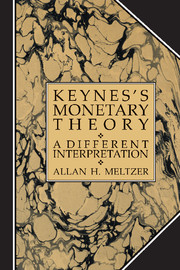Crossref Citations
This Book has been
cited by the following publications. This list is generated based on data provided by Crossref.
Brunner, Karl
1989.
Monetary Economics in the 1980s.
p.
197.
Wagner, Richard E.
1989.
Politics, central banking, and economic order.
Critical Review,
Vol. 3,
Issue. 3-4,
p.
505.
Rymes, Thomas K.
1990.
ON INTERNATIONAL TRADE IN BANKING SERVICES.
Review of Income and Wealth,
Vol. 36,
Issue. 4,
p.
403.
Bateman, Bradley W.
1991.
Hutchison, Keynes, and Empiricism.
Review of Social Economy,
Vol. 49,
Issue. 1,
p.
20.
Clarke, Peter
1994.
Keynes in History.
History of Political Economy,
Vol. 26,
Issue. 1,
p.
117.
Bateman, Bradley W.
1994.
In the Realm of Concept and Circumstance.
History of Political Economy,
Vol. 26,
Issue. 1,
p.
99.
Rogers, Colin
1994.
The State of Interpretation of Keynes.
p.
91.
Bateman, Bradley W.
1994.
The State of Interpretation of Keynes.
p.
103.
Marchionatti, Roberto
1999.
On Keynes’ Animal Spirits.
Kyklos,
Vol. 52,
Issue. 3,
p.
415.
Selgin, George
1999.
Hayek versus Keynes on How the Price Level Ought to Behave.
History of Political Economy,
Vol. 31,
Issue. 4,
p.
699.
Burdekin, Richard C. K.
and
Siklos, Pierre L.
2003.
Fears of Deflation and Policy Responses Then and Now.
SSRN Electronic Journal ,
Cesarano, Filippo
2003.
Keynes's Revindication of Classical Monetary Theory.
History of Political Economy,
Vol. 35,
Issue. 3,
p.
491.
Cesarano, Filippo
2003.
Defining fundamental disequilibrium: Keynes's unheeded contribution.
Journal of Economic Studies,
Vol. 30,
Issue. 5,
p.
474.
Sumner, Scott
2004.
How Have Monetary Regime Changes Affected the Popularity of IS-LM?.
History of Political Economy,
Vol. 36,
Issue. Suppl_1,
p.
240.
Tily, Geoff
2006.
Keynes's theory of liquidity preference and his debt management and monetary policies.
Cambridge Journal of Economics,
Vol. 30,
Issue. 5,
p.
657.
Meltzer, Allan
2009.
Revisiting Keynes: Economic Possibilities for Our Grandchildren.
History of Political Economy,
Vol. 41,
Issue. 4,
p.
760.
Backhouse, Roger E.
and
Bateman, Bradley W.
2009.
Keynes and Capitalism.
History of Political Economy,
Vol. 41,
Issue. 4,
p.
645.
Carabelli, Anna
and
Cedrini, Mario A.
2010.
Veiling the Controversies with Dubious Moral Attitudes? Creditors and Debtors in Keynes’s Ethics of International Economic Relations.
SSRN Electronic Journal,
Boughanmi, Aymen
2015.
Keynes et la tentation du protectionnisme, 1929-1933.
Histoire, économie & société,
Vol. 34e année,
Issue. 1,
p.
104.
Van Den Hauwe, Ludwig
2016.
Understanding Financial Instability: Minsky Versus the Austrians.
Journal des Économistes et des Études Humaines,
Vol. 22,
Issue. 1,
p.
25.





